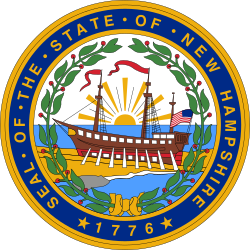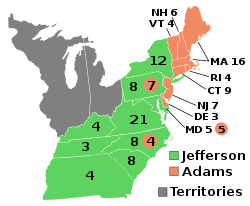This article has multiple issues. Please help improve it or discuss these issues on the talk page . (Learn how and when to remove these messages)
|
October 31 – December 3, 1800 | |||||||||||||||||||||||
| |||||||||||||||||||||||
| |||||||||||||||||||||||
| Elections in New Hampshire |
|---|
 |
The 1800 United States presidential election in New Hampshire took place between October 31 to December 3, 1800, as part of the 1800 United States presidential election to elect the President. Voters chose five representatives, or electors to the Electoral College, who voted for President and Vice President.
Contents
New Hampshire voted for incumbent Federalist President John Adams over Democratic-Republican Vice President Thomas Jefferson, this is one of re–match presidential elections because both candidates were faced in the 1796 presidential election. However, Thomas Jefferson would win the national presidential election. Making this presidential election as the first time New Hampshire voted for a losing candidate in its presidential voting history.


